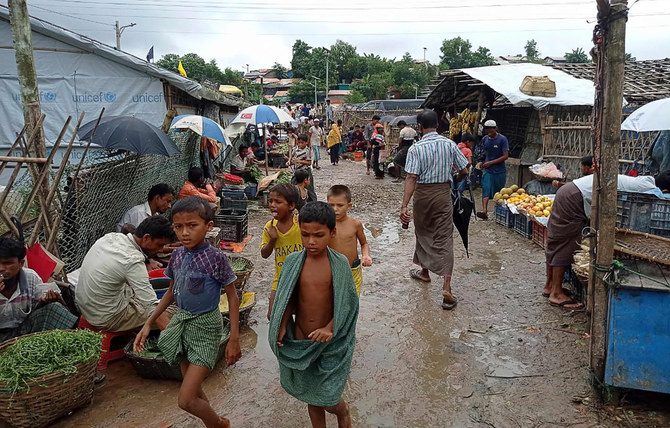DHAKA: Bangladeshi authorities and the UN are preparing to introduce formal education using a Myanmar curriculum for hundreds of thousands of Rohingya children living in refugee camps in Cox’s Bazar.
The fishing port in southeastern Bangladesh, hosts more than 1.1 million Rohingya Muslims — members of an ethnic and religious minority group who fled persecution in neighboring Myanmar during a military crackdown in northern Rakhine state in 2017.
The children, who constitute half of the refugee population, now attend 6,250 informal learning centers run by UN agencies and aid partners at 34 camps in Cox’s Bazar, which provide basic education to more than 354,000 students.
The Bangladeshi government in January 2020 agreed with the UN that the Rohingya children should be provided with Myanmar education to prepare them for a future return to their country. Stalled by coronavirus disease pandemic lockdowns for one-and-half years, a pilot program is now set to be launched as Bangladeshi schools reopened last month.
Regina de la Portilla, UN refugee agency spokesperson at Cox’s Bazar, recently told Arab News: “The Myanmar curriculum is to be introduced in learning centers, as per the government of Bangladesh request, with the objective that children can restart their education when they are able to safely and voluntarily return to their home country. Preparations are completed to roll out the pilot.”
The foreign ministry expected the program to be launched soon as final preparations are underway. A ministry official, who wished to remain anonymous, said: “We are working on it and are currently busy with last-minute preparations. We hope to roll out the curriculum anytime soon.
“We have made some observations in the curriculum to incorporate Myanmar culture. Our objective is to prepare them to integrate with the Myanmar society once they are repatriated,” he said.
BRAC, the largest development organization based in Bangladesh, which has been running learning centers for 65,000 Rohingya children in Cox’s Bazar, plans to teach them in Myanmar’s main language, Burmese.
Khan Mohammed Ferdous, BRAC’s education program chief at Cox’s Bazar, told Arab News: “Teachers at our learning centers have received basic training but are yet to be trained for the new curriculum.
“Currently, we are following a learning competence framework and approach, a government-approved guideline for the informal education system. Gradually, the framework will jump into the Myanmar curriculum.”
Rohingya parents in Cox’s Bazar are waiting for the introduction of the new curriculum, which would help prepare them for future repatriation.
Fatema Begum, 35, said she had been worrying about her four children as formal education was not available at the camps.
“The introduction of the Myanmar curriculum in the camps is inspiring news to me because my children will have the opportunity to learn more about their homeland. They will have the eligibility to pursue higher education,” she added.
Abdur Rahim, 41, a father-of-three, was also hoping for a better future for his children.
He said: “The boys and girls at Rohingya camps have nothing to do except roam around. When the Myanmar curriculum is launched, they will be able to receive some quality education, which will help them to pursue a better career in Myanmar.”
Prof. Amena Mohsin from the University of Dhaka’s international relations department described the move as a “message” to the world that Rohingya refugees were Myanmar citizens whose opportunities in Bangladesh were limited.
She said: “There is no point in teaching the refugee children with the Bangladeshi curriculum since they are not allowed to get engaged in any formal job in Bangladesh. The Myanmar curriculum will help them prepare for livelihoods when they return to Myanmar.”




























